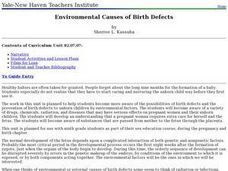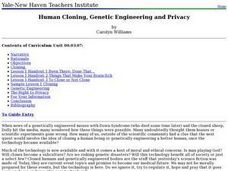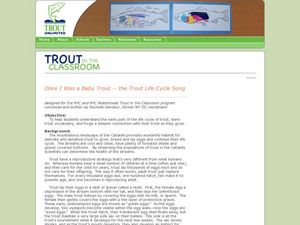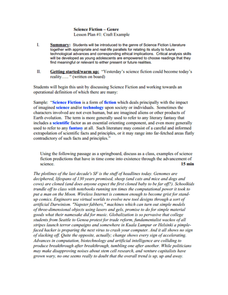Curated OER
Environmental Causes of Birth Defects
Get your high schoolers thinking about the factors that lead to birth defects. They examine how environmental factors and personal choices can cause birth defects in unborn children. They discover the effects of various handicaps such as...
Curated OER
Human Embryology
Ninth graders are introduced to the concept of human embryology. Individually, they complete an exercise in which they determine which trait they got from which family member. In groups, they identify and label the reproductive organs...
Curated OER
Human Cloning, Genetic Engineering and Privacy
Review the aspects of human cloning and the moral issues associated with it. Individually, your students will keep a list of the articles related to this issue and research issues related to the ethic issues people are concerned with....
Curated OER
Gender Role Development
Young scholars look in newspapers and magazines and discuss gender role development and stereotypes. For this gender lesson plan, students bring in their favorite objects that have no gender stereotype linked to it.
Healthy Native Youth
Chapter 2: Learning About Adolescence
The Native American symbol, The Circle of Life, represents life's spiritual, physical, mental, and emotional well being. By way of deep discussion, and two games, the instructional activity uses the Circle of Life to explore the stages...
Curated OER
Genetics, Birth Disorders, and Pregnancy
Students in an alternative school setting for pregnant teens examine various facets of pregnancy including prenatal and postpartum testing, genetic influences, and additional risk factors. Through videos, hands-on activities, and small...
Curated OER
LIFE IN SPACE Human Body: An Un-Earthly Home
Students examine an effect of zero gravity on the human body using a baby food jar, balloons and a jar with a large mouth.
Curated OER
Once I Was a Baby Trout
Students sing a song about the trout life cycle. In this trout life cycle lesson plan, students learn trout vocabulary and make motions while singing this song.
Appalachian State University
Science Fiction - Genre
Unsuspecting George McFlys are presented into the craft workings of the science fiction genre of literature. Speculations are developed through teacher-led dialogs about how science fiction impacts science, technology, and comments on...
Curated OER
Health: Symptoms and Stages of Pregnancy
Students examine the growth and changes that occur during the three trimesters of pregnancy. Issues such as toxemia and spontaneous abortion are also considered. In groups, students rotate to various stations exploring aspects related...
Curated OER
Desert Tortoise Tale
Students listen to a reading of the "Desert Tortoise Tale" and complete a maze that highlights the different threats the baby tortoise faces along the way. They discuss the reasons the Desert Tortoise is becoming endangered.
Curated OER
Social Studies: Classroom Culture
Sixth graders compose a list of classroom cultural values. They begin with a list of unacceptable behaviors. Each student presents two ideas they think should be part of the class culture. Students try to persuade classmates to accept...
Curated OER
Water Pollution Lesson Plan: Don't Trust Your Eyes
Students develop a list of actions they could perform that would protect our water resources from pollution. They formulate hypotheses, conduct experiments and draw conclusions about actual pollutants found in our water supply.
Curated OER
JUST A MATTER OF TIME
Learners recognize the dynamic changes in themselves and in agriculture that have occurred through the years. They are shown pictures of a baby or students are asked to think of their little brothers or sisters or themselves in...















